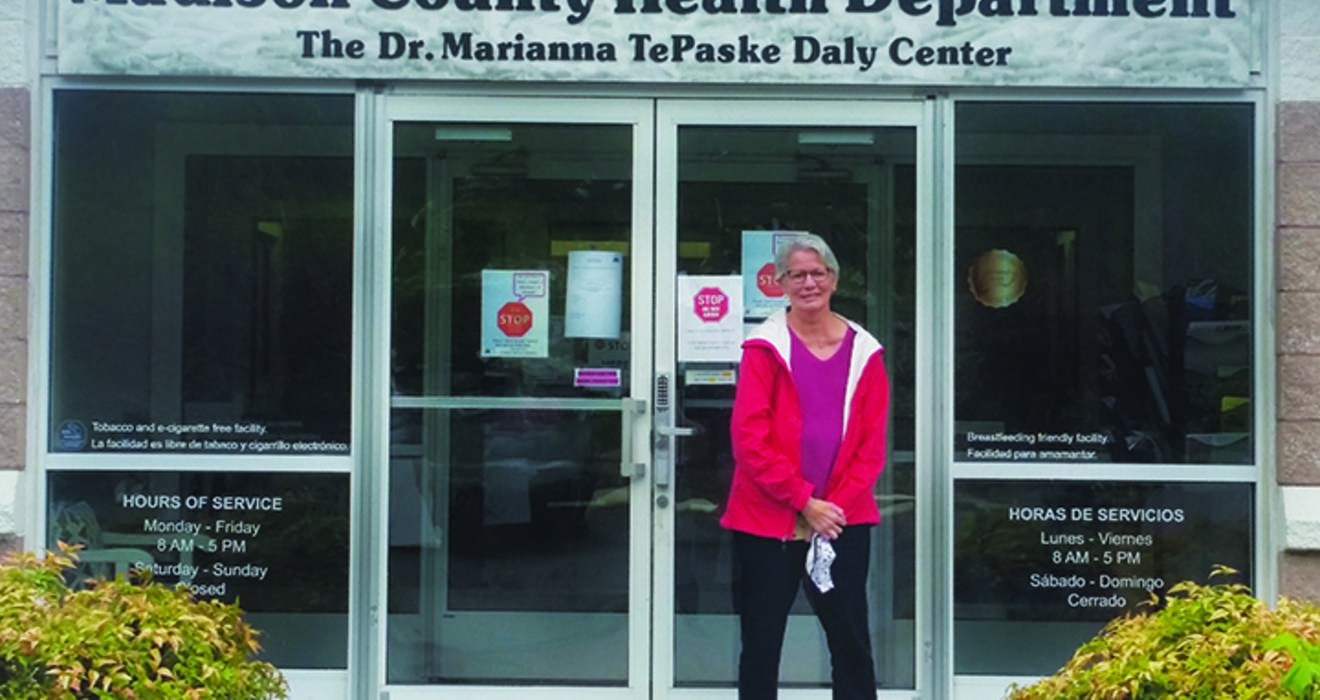
March 2, 1958 – January 25, 2021
North Carolina’s rural Madison County does not have a hospital or an urgent-care center; it has only a pharmacy and two health-care providers. One of those two is the Madison County Health Department, where Marianna TePaske Daly ’79 served as the medical director for about three decades.
Daly noticed that the dearth of some health-care services, like treating hepatitis C, meant that some residents had to travel more than an hour to a neighboring county, where there would be a six- or seven-month-long waiting list. She took the initiative to participate in a program that allowed her to bring hepatitis care to Madison County.
“If she saw a need, she was going to figure out how we were going to deal with it here in this county,” says Madison County’s current health director, Tammy Cody, who was also a friend of Daly. “The difference she made in so many things was truly life and death.”
While large geographically, the rural Appalachian county is home to only about 20,000 people, nearly 18 percent of whom live below the poverty line. Daly was raised in a different, more affluent part of North Carolina by a Duke professor and a schoolteacher, yet her community in Madison County viewed her as one of their own, and she thought of them as her family.
Her parents encouraged her to ask questions and help others, which took her to Princeton and then to medical school, with a year’s stop in between to work in Appalachia’s coal fields with the Jesuit Volunteer Corps (she was active in her Catholic faith throughout her life).
After focusing her medical studies on rural public health, Daly arrived in Madison County for an internship. She fell in love with the local people and culture and decided to settle there as a general-practice family physician.
“Many doctors join the profession for different motivations, but Marianna wanted to give back. She wanted to help underprivileged people,” says Carol Meier ’79, Daly’s college roommate. “She was in it to accomplish what she could and make people’s lives better.”
Daly worked hard to address the medical problems of her adopted community. To combat the opioid epidemic, which has taken an especially large toll in rural America, for example, Daly made sure that the health department could offer a medication-assisted treatment program for substance abuse. Madison County’s health department was the second in the state to do so — and it would have been the first if not for Daly’s cancer, which occurred as the program was close to launching.
She was a doctor who made house calls. “I don’t think that’s normal, even in the rural clinic that she worked in,” says Jerry Powers ’80, of her attention to patients. “That’s about as personal a touch as you can give.”
Outside of her work, Daly was guided by a long-held motto: Solvitur ambulando — “it is solved by walking.” When she received her terminal cancer diagnosis in 2019, Daly planned to do a lot of walking, but the pandemic closed her go-to spot, the North Carolina Arboretum. With the help of arboretum staff and a good friend, it reopened just for her, as a “perfect bucket-list day in the mountains.”
“My walk at the arboretum may not have cured my cancer or solved COVID-19, but it made me smile,” Daly wrote in an essay shared with friends. “And for now, that is solution enough for me.”
A year before her death at 62, the Madison County Health Department building was renamed in her honor.
Anna Mazarakis ’16 is a podcast producer.





1 Response
Bill Casp ’76, M.D.
4 Years AgoThe Difference One Person Can Make
Thank you for honoring Marianna TePaske Daly ’79, M.D. (“Lives: An Appreciation,” February issue).
I met her at a UNC Internal Medicine meeting in the 1990s. She and I attended that conference for the next 20-plus years, sharing remembrances and also Princeton basketball NCAA appearances (the conference is held in mid-March). In March 2019, Marianna was telling me about the chemo and radiation ahead of her. When an acquaintance asked her about me, she said simply, he is a college friend, not revealing what had occurred seconds before.
Marianna was a front-line doctor, and her work in Madison County, North Carolina, has saved many lives from HIV, hepatitis C, and opiate use disorder. One dedicated person (and Princeton grad) can make a great difference in a rural setting.